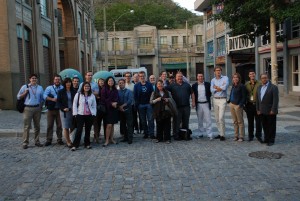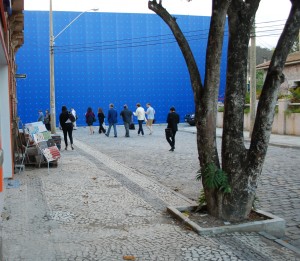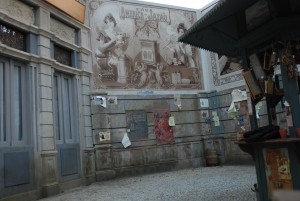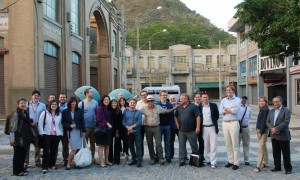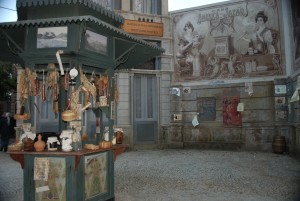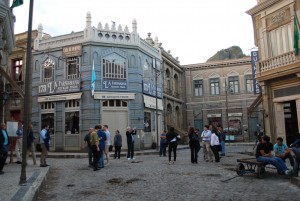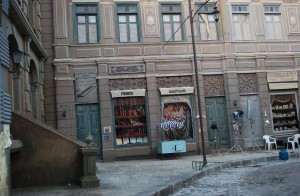Bomba was born when a diverse group of Africans found themselves forced to work the sugar plantations of Puerto Rico. From different places, speaking different languages, they found a common means of expression and release in drumming, dancing, and singing together. This new musical lingua franca became bomba. It remained popular after Emancipation, when traveling groups would carry the big barrel drum, smaller secondary drum, and trunks with percussion and costumes from place to place, holding all-night, rum-fueled sessions on beaches or in yards.
Its origins in Africa and in the great movement of Africans throughout the Caribbean tie bomba to other Afro-Latin traditions from Haiti to Cuba, sharing beats, instrumentation, and even terminology. But in Puerto Rico, bomba developed a wonderful local texture and character, and continues to be a moving and meaningful response to life on the island.
Two of Hijos de Agüeybaná’s members discovered its power and relevance and have dug into its past. Drummer, multi-instrumentalist, and researcher Ángel Luis was raised in New York City in a musical family who played in a band together. Yet he first heard bomba at a photo shoot as a young man. He was immediately blown away.
”I thought it was African music. I was stunned to hear it was from my island, from my home,” he recalls. He soon found himself returning to Puerto Rico, winning over sometimes reticent bomba elders, interviewing dozens upon dozens of veteran musicians and dancers to learn more about how, when, and why the music was performed.
His son, Otoqui, grew up dancing bomba from the very start; his mother danced while pregnant with him. Gently introduced to the tradition and mentored by his father, Otoqui turned away from bomba as a teen and got into break dance. “I realized hip hop wasn’t my music, that break dancing wasn’t my culture,” Otoqui recalls. “I thought about it, and decided I wanted to change people’s minds. I wanted to teach my friends that they needed to learn our music.”
Though incorporating other Latin and international contemporary elements into their music and bringing a wide sonic palette to its pulse and feel, the Reyes and the other performers in Hijos de Agüeybaná have an uncanny ability to transmit the rootsy beauty, and the gracious culture of bomba. At the core is the evolving interaction between drum and movement, a dialogue that the group captured on the album.
”To find that feeling, sometimes you bring the dancers to the studio. Sometimes you imagine the dancer in your mind,” Otoqui says. “Sometimes you just bring your feeling into the drum. The drum itself speaks; it talks to people.”
The inspiring gesture and potential of dance pervades the songs. Otoqui wrote “Te Invito” as a lovely, heartfelt explanation of bomba’s creative pleasures to his hesitant sweetheart, a visual artist. He urges her to feel the dance floor is a canvas and her feet are brushes (she was eventually won over and now dances bomba). “Ohami” was sparked by a friend’s evocative dancing, movements that sent Otoqui from behind his drum dashing for his notebook to jot the images down. “Agua del Sol” celebrates the role of homebrewed rum in bomba celebrations, how it warms the heart and moves shy participants from the sidelines to the dance floor.
But bomba is about more than good times; it’s about dignity. “Ask any elder and they will tell you: Bomba is respect. You have to have respect throughout, for the drums, for your partners,” Ángel Luis notes. Yet this respect doesn’t stymie creativity; it helps channel it, finding new ways to make old beats dance and sing.
”Bomba is your heart expressing itself freely,” Ángel Luis smiles. “It’s the letting go. Letting it flow freely and reach out to the world.”
About Hijos de Agueybana
The group Hijos de Agueybana directed by Otoqui Reyes consists of eight artists, all committed to preserving their Afro-Caribbean roots. The group has over ten years experience both of performing and offering workshops and courses on the historical and cultural significance of the genre of bomba. They have presented their dance and music to both national and international audiences across the Americas. In the Caribbean the African drum is central to cultural identity creating harmony, solidarity and leadership in both the music itself and the musicians who perform it, helping maintain social structure in communities and villages all over the Island.
In this, their first musical production, Otoqui Reyes, in collaboration with other great artists Cristi Mangual, Andy Montañez and Tony mapeyé creates a flavour unique to Puerto Rico. The drum or tambor Barril-Primo is played by Ángel Luis Reyes and Otoqui Reyes, reveling in its traditional rhythm whilst also integrating with other popular rhythms such as salsa and jazz, and electronic instrumentation such as indigenous-environmental “Lounge”. This creative collaboration is achieved by quality musicians such as: Luis Rosa, Tony Gonzalez and Ricky Torres, committed to creating art and music out of their rich culture. Complementary to the main drums come the second smaller ones which are played by Ramon Vazquez and Papo Aguilú together Jose Alicea, and Maraca. The harmony produced in several layers of drumming is accompanied by the joyful voices of Naomi Vasquez, Minerva Rosa and Quique Hernández.
Everything builds together in this production, like a big street party full of dance, culture and tradition – a great and tasty celebration of life!
